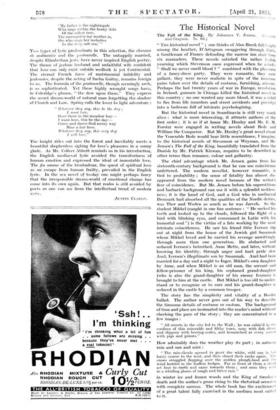The Historical Novel
The Fall of the King. By Johannes V. Jensen. (Gr.iyson and Grayson. 75. 6d.) " THE historical novel " ; one thinks of Alan Breck full-k ngth among the heather, D'Artagnan swaggering through Paris, a Gentleman of France defending the narrow inn stair from six marauders. These novels satisfied the rather foolish yearning which Stevenson once expressed when he asked ; " Shall we never smell blood ? " combined with the pleasures of a fancy-dress party. They were romantic, they were gallant, they were never realistic in spite of the immense pains taken over the details of costume, furnishing, armour. Perhaps the last twenty years of war in Europe, revolution in Ireland, gunmen in Chicago killed the historical novel in this country ; no one wanted any more blood, it was a relief to flee from life (murders and street accidents and- poverty) into a bedroom full of intricate psychologizing.
But the historical novel in Scandinavia is still very much alive : what is more interesting; it attracts 'authors of the first order ; it is as if at home Mr. Huxley and Mr. E. M. Forster were engaged in writing novels about Bede and William the Conqueror. But Mr. Huxley's great novel about the Venerable Bede would bear little resemblance, I imagine, to the historical novels of Stevenson or 'Weynaan, and Mr. Jensen's The Fall of the King, beautifully translated from the Danish by Mr. Patrick Kirwan, requires to be described in other terms than romance, colour and gallantry.
The chief advantage which Mr. Jensen gains from his sixteenth-century baCkground is that he can use coincidence unfettered. The modern novelist, however romantic, is tied to probability ; -the sense of fatality has almost dis- appeared from the modern novel because of the writer's fear of coincidence. But Mr. Jensen before his superstitious and barbaric background can use it with a splendid reckless- ness; it is the hand of God, and a God who in mediae al Denmark had absorbed all the qualities of the Nordic deities, was Thor and- Woden as much as he was Jarveh. So the student Mikkel (caught in one fine sentence : " He sucked his teeth and looked up to the clouds, followed the flight of a bird with blinking eyes, and communed in Latin with his immortal soul ") is the victim of a fate working by the most intricate coincidences. He saw his friend Otte Iversen slip out at night from the house of the Jewish girl Susannah whom Mikkel loved and he carried his revenge unwittingly through more than one generation. He abducted and seduced Iversen's betrothed, Anne Mette, and later, without knowing his identity, through anger and hurt pride slew Axel, Iversen's illegitimate son by Susannah. Axel had been married for a day and a night to Inger, Mikkel's own daughter by Anne, and when Mikkel is an old man, the servant and fellow-prisoner of his king, his orphaned grand-daughter (who is also the grand-daughter of his enemy Iversen) is brought to him at the castle. But Mikkel is too Old to under- stand or to recognize or to care and his grand-daughter is seduced in the castle by a common trooper.
The story has the simplicity and vitality of a Border ballad. The author never goes out of his way to describe the tiresome details of costume or custom. The background of time and place are insinuated into the reader's mind without checking the pace of the story ; they are concentrated in a few images :
" All streets in the city led to the Wall ; he was cabin'd in the confines of this miserable and filthy town, oozy with fish slime, and slippery with herring-scales, and besmirched at every corner with pigs and priests."
How admirably does the weather play its part ; in autumn rain and sun and mist :
" The rain-clouds opened to greet the white, cold sun in her hasty course to the west, and then closed their ranks again. The Crows struggled flapping- over the sodden plough-land and t he wind howled in the leafless hedges. Far in front of them a cloud set foot to earth and came towards them ; and soon they rode in a whirling gloom of tough and bitter rain "
in winter ice and frozen woods and the King of Sweden's death and the author's prose rising to the rhetorical occasion with complete success. The whole book has the excitement of a great talent fully exercised in the medium most suited t4 it.






































 Previous page
Previous page